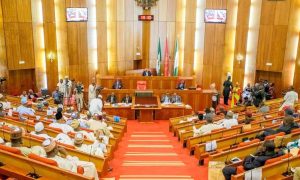In line with our expectations, the Monetary Policy Committee (MPC) of the Central Bank of Nigeria (CBN) again voted to raise the Monetary Policy Rate (MPR) by 200bps to 24.75% in March. We highlight that the committee’s decision to hike the MPR further was hinged on (1) the existing inflationary pressures, (2) the need to anchor inflation expectations, and (3) maintaining the stability of the exchange rate. Additionally, the MPC narrowed the asymmetric corridor to +100bps/-300bps around the MPR (Previously: +100bps/-700bps) and adjusted the Cash Reserve Requirement (CRR) for merchant banks to 14.0% (Previously: 10.0%) whilst retaining the CRR for Deposit Money Banks (DMBs) at 45.0%. The Committee also retained the liquidity ratio at 30.0%.
On Domestic Growth: The MPC anticipates that domestic economic growth will remain positive despite high inflationary pressures and weak consumer demand. Notably, the MPC maintained its average projected growth rate of 3.38% for 2024, higher than our forecast of 2.92%. Similarly, the CBN’s GDP forecast exceeds the International Monetary Fund’s (IMF) projection of 3.0% but lower than the Federal Government’s projection of 3.88%.
On Inflation: The MPC observed the persistent increase in price pressures, attributing this trend to the substantial pass-through of the exchange rate to domestic prices, elevated logistics and energy costs, ongoing insecurity in food-producing regions, and significant infrastructure deficiencies. The Committee anticipates that these upward price pressures will persist in the short term before moderating towards the second half of the year.
On Foreign Exchange: The committee highlighted the stability of the naira after the previous MPC meeting and attributed it to the market reforms, increased CBN intervention and the successful clearance of the FX backlog, which has strengthened confidence and supported liquidity in the FX market. In addition, the committee noted the increased FX inflow from Foreign Portfolio Investors (FPIs) due to higher yields on fixed-income securities. Nevertheless, the MPC affirmed its commitment to sustaining its intervention in the FX market to ensure that the naira remains stable while building confidence in the market in the medium term.
Cordros’ View
We previously indicated that while the full impact of the 400bps increase in the MPR has yet to reflect in domestic prices fully, the need to (1) anchor inflation expectations, given the continued upside risks to inflation, (2) tighten monetary conditions, and (3) sustain investment inflows from Foreign Portfolio Investors (FPIs), will form the basis for the MPC decision to raise the MPR further while maintaining other parameters. As anticipated, the committee raised the benchmark interest rate by 200 basis points to 24.75%. However, contrary to our expectations of maintaining other parameters unchanged, the Committee narrowed the asymmetric corridor to +100/-300 basis points around the MPR (previously +100/-700 basis points) as part of its tightening measures. Additionally, the MPC adjusted the CRR for merchant banks to 14.0% from 10.0% while retaining the CRR for DMBs at 45.0%. The liquidity ratio was held at 30.0%.
The committee highlighted that global risks to inflation remain significant, including ongoing geopolitical tensions and the likelihood of central banks in advanced economies maintaining high interest rates for a more extended period due to inflation remaining above target levels. We anticipate a continuance in the disinflationary trend in developed economies, primarily driven by lower energy prices, a slowdown in consumer demand, and a higher base effect from last year. However, given that inflation remains above target levels, we do not expect central banks to begin rate cuts until the second half of 2024.
Domestically, consumer prices are projected to maintain an upward trend in the short term, supported by a low statistical base in the first half of 2024 and food shortages induced by harvest depletion and heightened insecurity in food-producing regions. Based on our model, we expect inflation to peak in May at 33.24%. For clarity, while headline inflation is expected to remain high year-on-year, we anticipate moderate increases in domestic prices on a month-on-month basis, primarily due to the stability of the naira, which could support a mild increase in the MPR. Consequently, we project a 100bps increase in the benchmark interest rate at the next meeting in May.
Market Impact
Fixed Income: The outcome of this meeting is likely to trigger further rounds of bearish sentiments across the mid-to-long end of the yield curve, albeit moderately. This could influence higher participation and rates on government debt instruments at tomorrow’s NTB Primary Market Auction (PMA). Moreover, we expect the aversion to long-dated instruments to persist due to near-term expectations of a further moderate increase in interest rates. Thus, we recommend that investors stay at the short end of the yield curve rather than hold long-dated bonds. Furthermore, considering our expectations of continued interest rate increases, we advise investors to exercise caution when considering investments in long-duration instruments as they may not adequately compensate investors for the risks associated with rising interest rates.
Equities: Given the outcome of the MPC, we believe the hawkish tone of the MPC will continue to worsen risk-off sentiments in the local bourse, particularly among domestic investors who represent the majority (81.6% as of February 2024) of market participants. Accordingly, we foresee minimal shifts in trading patterns, with investors exhibiting caution and displaying a subdued interest in stocks. In our view, we think trading in the equities market will remain choppy given the absence of significant positive catalysts. However, the awaited earnings releases from the banks and accompanying dividend declarations may catalyse another rush of positive sentiments, supporting buying activities on the bourse.
Cordros



























